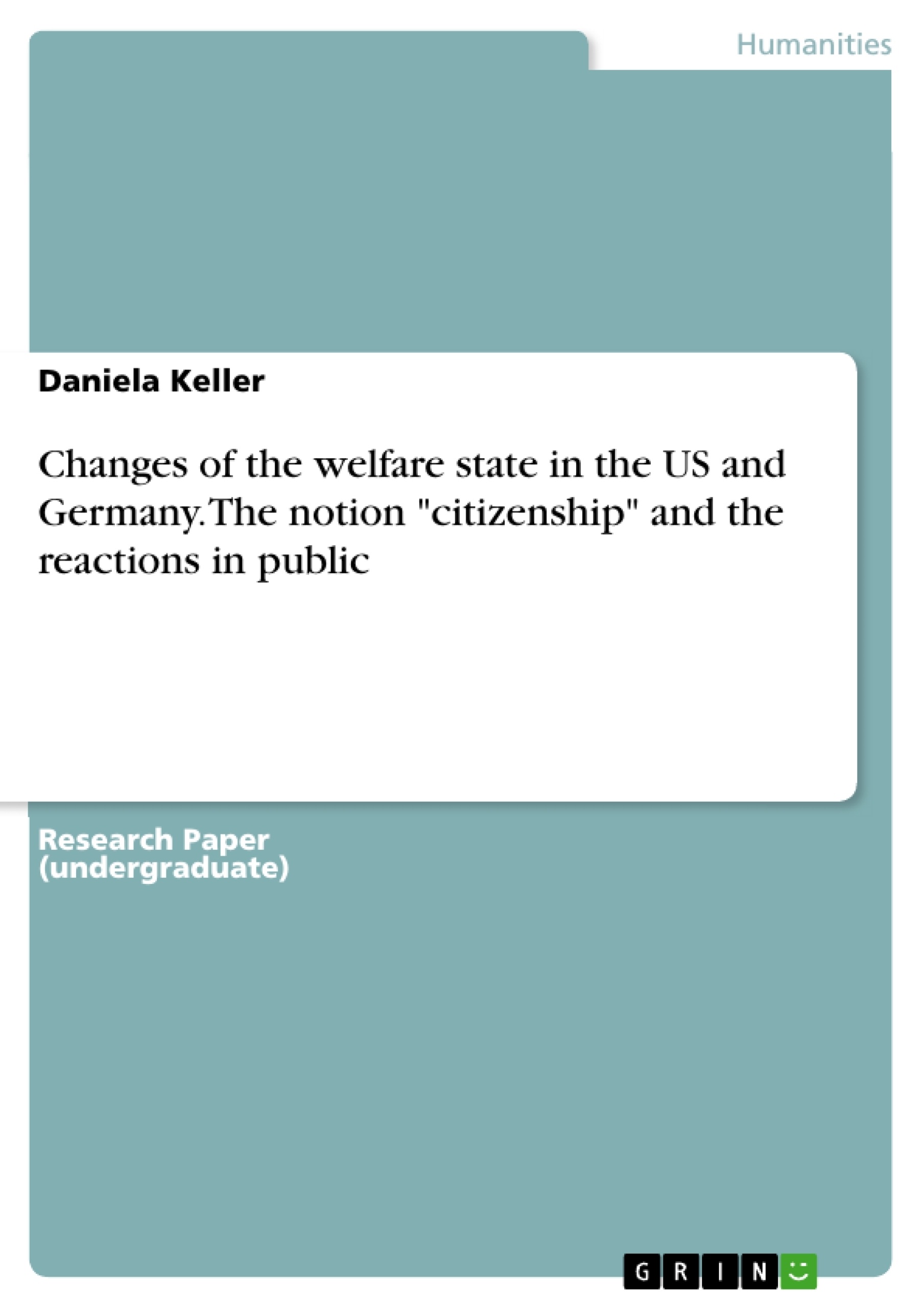In both Germany and the United States, Social Security matters declined in the last decade, be it the money for unemployed people, for pensioners or the tuition for students. In this paper, it should be investigated how the reforms changed the welfare state system, and how the discussions were led in the US and in Germany. By investigating surveys, newspapers and political party programs, I investigate which kind of notion of a citizen lies beyond the debates in these countries. In what kind of social state are people living, what image of a citizen do they have and how are debates about welfare state programs led? Which kind of words and which values are used in the current debates? For this investigation, it will firstly also be explained which theoretical notions of social citizenship and of the welfare state will be taken into consideration for the my investigation.
Inhaltsverzeichnis (Table of Contents)
- The current social security debate
- Theoretical Framework
- The notion of citizenship
- The social welfare state
- The US and German welfare state
- Opinions about the welfare state
- Current American and German newspaper articles about changes in the welfare state
- German newspaper articles
- American newspaper articles
- German and American newspaper in comparison
- Political parties and the current changes in the welfare states in the US and Germany
- The SPD and the current changes in the German welfare state
- The republican party and the current changes of the American welfare state
Zielsetzung und Themenschwerpunkte (Objectives and Key Themes)
This paper examines the current social security debate in the US and Germany. It investigates how welfare state reforms have changed social security systems and explores the discussions surrounding these changes in both countries. The paper aims to understand the concept of citizenship underlying these debates, analyzing surveys, newspapers, and political party programs to determine the prevailing image of a citizen and the values guiding the discourse on social security.
- The evolution of the concept of citizenship from ancient Greece to modern social welfare states
- Theoretical frameworks for understanding social citizenship and the welfare state
- Comparing different models of the welfare state, including liberal, corporatist, and social democratic approaches
- Analyzing the discourse on social security in the US and Germany, focusing on media coverage, public opinion, and political party positions
- Exploring the relationship between the welfare state and the notion of citizenship in both countries
Zusammenfassung der Kapitel (Chapter Summaries)
- The current social security debate: This chapter introduces the topic of social security changes in the US and Germany, focusing on the declining importance of social security issues in recent years and the need to investigate the impact of reforms on social security systems and the related debates.
- Theoretical Framework: This chapter outlines the theoretical framework for understanding the concept of citizenship, tracing its development from ancient Greece to the modern welfare state. It explores different theoretical approaches to social citizenship, including those of T.H. Marshall, John Rawls, and Esping-Andersen.
- Opinions about the welfare state: This chapter delves into public opinion regarding the welfare state in the United States, specifically focusing on concerns about retirement security and the impact of President Bush's proposed Social Security reforms on public sentiment.
Schlüsselwörter (Keywords)
This paper examines the changing welfare state in the US and Germany, focusing on the theoretical framework of citizenship, social welfare systems, public opinion, media coverage, and political party positions. It explores concepts such as social citizenship, liberal and corporatist welfare models, social security reforms, and the relationship between the welfare state and the notion of citizenship in both countries.
Frequently Asked Questions
How has the welfare state changed in the US and Germany?
Both countries have seen a decline in social security benefits for the unemployed, pensioners, and students over the last decade due to various reforms.
What is the "notion of citizenship" in the social security debate?
It refers to the underlying image of what a citizen is—whether they are viewed as entitled to support or primarily responsible for their own welfare.
How do American and German newspapers cover welfare reforms?
The study compares media discourse, looking at the specific words and values used to frame changes in social security programs in both countries.
What are the different models of welfare states?
The paper discusses liberal (US), corporatist (Germany), and social democratic models of welfare and how they define social citizenship.
What role do political parties play in welfare changes?
The study analyzes party programs, such as the SPD in Germany and the Republicans in the US, to see how they drive social security reforms.
- Quote paper
- Daniela Keller (Author), 2005, Changes of the welfare state in the US and Germany. The notion "citizenship" and the reactions in public, Munich, GRIN Verlag, https://www.grin.com/document/37333



